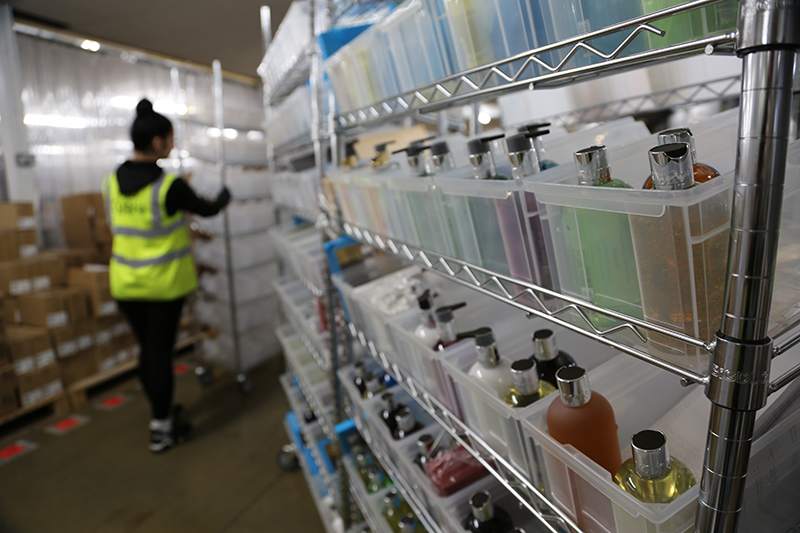In 2020, almost every industry had to dramatically adapt their purchasing experience. Various trends picked up pace – including the use of VR, big data and augmented reality technology – in an effort to replace the previously possible in-store experiences.
Simon Clifford from Cygnia Logistics discusses the current climate of the beauty industry, as well as predictions for how the industry is likely to look post-Covid.
As of 2020, the UK’s beauty industry is worth around £27 billion, ranking as the seventh largest cosmetics market in the world. The industry traditionally enjoyed an interactive purchasing experience, with high-end beauty retailers priding themselves on a personalised in-store experience.
However, the Covid-19 pandemic meant that every beauty retailer had to adapt, with shops being shuttered for much of the past year throughout various lockdowns.
Almost every brand had to pivot towards online sales, introducing new technologies to allow for virtual testing and partnering with 3PLs to carry out the delivery process to customers.
The impact of Covid-19
Increase in online sales
The closure of brick and mortar stores meant consumers had to purchase beauty products online, with around 37.2% of consumers purchasing health and beauty products online in the last year. In addition, the prestige beauty industry saw sales of £491 million from January to October 2020 – a 38% increase from the same period in 2019.
Making use of the digital platform
Many forward-thinking brands have used the shift towards online sales as an opportunity to step up their digital offering. For example, Aveda created a series of videos on Instagram to provide advice on hair styling and hair care, resulting in views increasing by over 200% since launch. Another example is MAC’s virtual try on tool, which allows consumers to try on eyeshadow and lipstick shades. This saw a 300% increase in consumer use since lockdown began.
New customer segments
Covid-19, and various lockdowns since, has encouraged entirely new demographics to move online, with those who preferred to purchase in-store having to purchase online whilst stores were closed. Many brands have seen an increase in purchases from the ‘silver surfer’, with older customers accessing beauty products and services online for the first time.

What will the industry look like post-Covid?
Once the effects of the pandemic slowly subside and restrictions continue to ease, many are questioning how businesses will adapt. Will they revert back to old ways of operating? Which trends will remain, if any? And will there be any new technologies or purchasing experiences emerging? Here’s our predictions for how the beauty industry is likely to evolve post-Covid:
1. Online purchasing is here to stay
The in-store experience is still enjoyed by many, but the absence of it in the past year has allowed consumers to see how simple and enjoyable the process of purchasing products online can be. As a result, it’s likely that the industry will still see a large share of purchases remaining online, albeit likely lower than 2020’s levels.
Samantha Dover, senior retail analyst at Mintel said: “Although growth in the online beauty market was strong prior to the COVID-19 outbreak, it was slowing as retailers were struggling to increase engagement with the channel. However, 2020 marked a turning point as online demand surged amidst disruption. Whilst a reluctance to visit physical stores and an eroded in-store experience will benefit online sales for some time, retailers can more fully take advantage of the new reliance beauty consumers have on the online channel.”
2. Increase in beauty subscription services
A report from Royal Mail predicts the value of the subscription box market will grow 72% by 2022. Services such as Birchbox and Glossybox have led the way, showing just how successful a beauty subscription box business can be. Throughout the past year, the number of brits signed up to subscription boxes has increased, with two in five consumers signing up to a subscription box since the pandemic began. The subscription market is likely to continue to grow as more and more consumers learn of the ease of the services.
3. Personalised beauty
A survey by Epilson revealed that 80% of consumers are more likely to purchase a product if a brand offers personalisation, and 90% stating they find personalisation appealing. In an effort to replace the in-store personalisation experience, retailers have offered online quizzes and virtual try-on tools to create a personalised recommendation for eCommerce consumers.
This popularity of personalisation is likely to see online retail continuing to adopt and adapt the ability for consumers to create a personal recommendation, prior to purchasing beauty products.
4. Brand authenticity
Today, consumers look for authentic brands with a strong sense of purpose. As a result, many beauty businesses have developed a far better understanding of the importance of defining what they stand for. The significance of brand authenticity has been heightened since COVID-19, with brands doubling down on communications and consistently engaging with customers online. We can expect to see brands continuing to focus on this genuine communication and clear messaging post-Covid.
5. Transparency in operations
The pandemic has made transparency of operations a priority for every business. Delays in shipping revealed the weaknesses in many supply chains, unable to react to changing demand and alterations to the international supply network. Most significantly though, the COVID-19 pandemic has shown the importance of an agile and versatile supply chain that can pivot with ease.
As a result, it’s likely that many beauty businesses will take a look into their supply chains, identify weaknesses and invest to improve upon those weaknesses.
From a customer perspective, transparency of supply chains is vital, as they are likely to want to use a brand with a supply chain they can rely on, as well as wanting to support brand who use sustainable and ethical methods to create and deliver products.
For information on how you can adapt your beauty business to continue to delight your customers post Covid-19, visit cygnia.net or call 01604 664 300.

